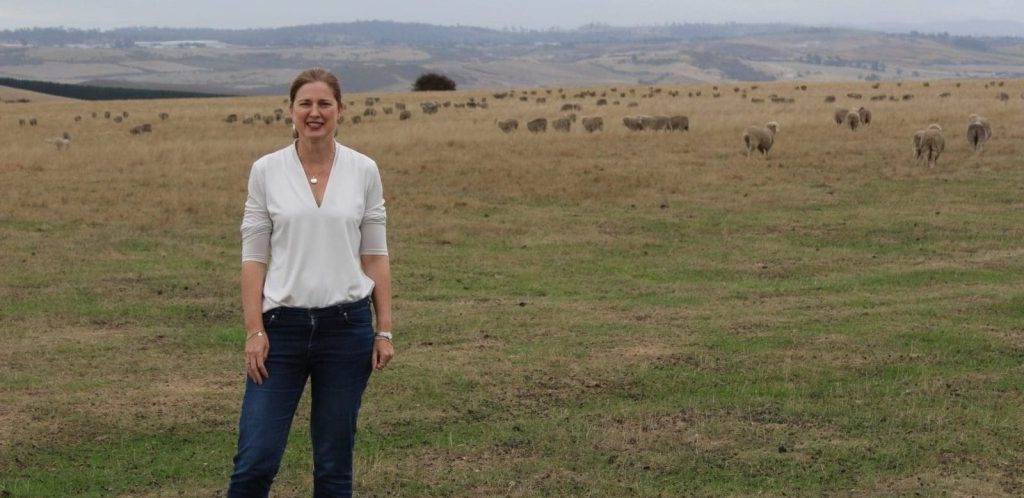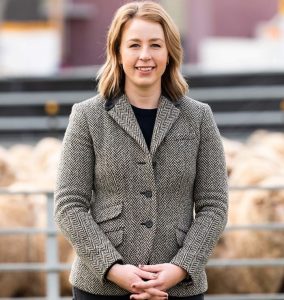
Minister for Agriculture Fisheries and Forestry Julie Collins.
IT seems Australia’s sheep industry might only be drip-fed details on the co-design process for the transition to the banning of live sheep exports by sea in May 2028 …. and without producer input.
While Minister for Agriculture Fisheries and Forestry Julie Collins claims the government’s live sheep trade is being implemented in a consultative and orderly manner, sheep industry leaders have expressed doubts about transition funding, its onground components and a mooted co-design process.
Ms Collins has brushed aside key questions about when a proposed transition advocate will be appointed or whether funding will be provided for on-ground farm business planning services and finance packages.
Sheep Central asked Ms Collins if the Federal Government accepted Sheep Producers Australia’s view that the transition package needs to be increased to four times its initial $107 million, when investment will begin and when the transition advocate be appointed.
She was also asked if funding will be available for on-ground farm business planning services and finance packages to support producers to explore alternative business models, if the transition plan includes solutions to mitigate reduced competition from the loss of the live sheep market or to increase air freight capability from Western Australia.
Ms Collins said the government took its live sheep export policy to the election “and we have gone about implementing it in a consultative and orderly manner.
“The legislation has passed the Parliament, and I am focused on ensuring a smooth transition,” she said.
“I’ll continue to meet with farmers and industry stakeholders to progress this package and more information about the transition support programs will be available soon.
“We are working hard every day to ensure that our more than $84 billion agriculture industry remains strong now and into the future.”
The Minister’s office also said the Government’s transition plan includes ongoing engagement and communication.
“It is important that we continue to work together where there may be concerns and to identify and understand emerging opportunities and challenges as the transition occurs.
“The 1 May 2028 end date has been set in law,” the minister’s office said.
“Setting a clear end date and provisioning transition assistance will enable the supply chain to take early action.
“The Australian Government has set out its transition plan to support the phase out of live sheep exports by sea.”

Sheep Producers Australia CEO Bonnie Skinner among the woolies.
Need for quick action to help affected farmers
Sheep Producers Australia chief executive officer Bonnie Skinner said while the government hasn’t flat out refused funding for on-farm business planning, it is very unclear if and when this resource will be funded and delivered.
“The government needs to move quickly to clarify how funding will be delivered to affected farmers and communities including committing to new resources for on-farm business planning.
“Producers can’t wait any longer,” she said.
“They are already being forced to make business decisions following the ban being announced.”
Ms Skinner said the recent extra $21m for Meat & Livestock Australia, Austrade and ag counsellor activities was not approved by, or discussed with SPA before its announcement by the minister last week as part of a $32.7m boost in the transition package.
“It is not clear how the announced funds and their allocation will be used to grow and enhance demand for the sheep meat industry, particularly those producers acutely affected in Western Australia.
“$17.6m of the announced funds appear to just support business-as-usual activities of the government,” Ms Skinner said.
“What are the KPIs that Austrade and the international trade counsellors will have against their budget to grow and enhance demand for the sheepmeat industry?
“A significant issue is getting our product to existing international markets, and that is why we have particularly sought the government’s focus on increasing air freight capability out of Western Australia to alleviate bottlenecks for sheep meat exports,” she said.
No producer involvement in transition co-design process
Ms Skinner said SPA has had no involvement in a transition co-design process.
“There has been no co-design process with Sheep Producers Australia.
“Sheep Producers Australia has consistently highlighted that the transition package is inadequate and that consultation on the implementation of this policy has left many producers feeling removed from a process that is impacting their families, businesses, and communities,” she said.
“The sheep meat industry – particularly sheep producers in Western Australia – understand their needs better than anyone.
“Any future co-design process must be genuinely focused on the people most impacted by the policy.”
During avisit to Western Australia last week Minister Collins said the government was talking to industry about the appointment of a transition advocate.
Ms Skinner said Sheep Producers Australia has not been requested by government to take on the transition role.
“Sheep Producers Australia’s job is to advocate for farmers during this unwanted transition – our job is not to advocate for the transition caused by a government ban opposed by industry.”
WAFarmers asked to recommend a transition advocate

WAFarmers president John Hassell speaks at the recent farmer rally in Canberra.
WAFarmers president John Hassell believes the Albanese Government has underestimated the folly and impact on industry of its live sheep trade phaseout policy.
“Any kind of package that delivers about 10 percent of the value that a trade is providing to the country is just treating us with contempt and I think they have failed miserably about realising exactly what they’ve done.
Mr Hassell said Ms Collins last week asked WAFarmers to come up with a recommendation for the transition advocate position.
“But until we know what the plan is to do with that entire amount of money and who is going to get help and how, how can we make a recommendation as to the best person for the job?
“The reality is that a big chunk of the $130 million is going to go back to the Federal Government and departments, and not one cent of it is going to go on the ground to growers as far as we can see.
“So how can we make a recommendation when we really don’t know what’s going to happen with that money?” he said.
“If they had a plan then we could probably say this is the best person who could help you.
“I’ve got some ideas, but until we see that how can you possibly make a recommendation?
Mr Hassell said if there were any funds to help farmers on-farm then a farm adviser could be the advocate, whereas a public servant would be more suitable if only government departments or other bodies were to be funded.
Mr Hassell said the transition would effectively try to consolidate around the state’s abattoirs all of the businesses – shearers, ag services and livestock transporters — servicing the sheep industry in regional rural communities in Western Australia.
“How are they going to replace that industry in all of those communities and create employment? “That’s the challenge they’ve got,” he said.
“If they are really serious about doing this, we don’t want country towns killed, this is about communities for us.
“If they are really serious about it, address that problem.”

The best thing the government could do (other than reverse their decision to close the sector) would be to make the transition timeframe longer to allow for the supply chain to adjust properly and pivot successfully to a growing boxed trade. The current timeline is far too short.
Spot on Matt. Couldn’t agree more. I suspect they aren’t engaging producers, because the current phaseout timeframe of four years is unachievable and they know it.
The decision to ban live export is borne out of complete ignorance.
The government has shunned viable markets and replaced it with nothing but the illusion of doling out some funds to processors for bigger chillers.
Hardly a plan.
Even if we have markets to absorb the extra onshore processed product we don’t have the container port capacity to cope and it is expensive.
They hide behind saying they took the policy to the electorate twice.
They lost one election and the next one they seized power with a far lower primary vote than the coalition, hardly a mandate.
In any case, they had six years to prepare for the ban and seemed to have done absolutely nothing.
On top of that, they knocked back Qatar Airlines request for more flights to Australia, and they carry airfreight chilled sheep carcases.
Labor has no credibility.